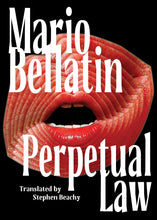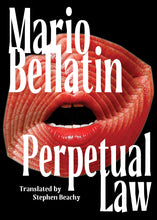By Mario Bellatin
Translated by Stephen Beachy
Publication Date: April 8th, 2025
From Latin America’s literary prankster Mario Bellatin: a novella that puzzles from the first page with its liminal, Lynchian atmosphere.
Paperback ISBN: 9781646053384
eBook ISBN: 9781646053421
Description
In an unnamed country by the sea, a grieving kleptomaniac known only as Our Woman is determined to reach the House. There, she will be able to listen to her childhood voice. As she winds her way through a day replete with odd choices and unresolved conclusions, the losses that define Our Woman take clearer shape, while the circumstances of her world turn more opaque. Inhabitants form poetry salons and line up for measly food distributions. Authoritarian landladies maintain an iron-grip on their complexes, men in blue overcoats roam the streets, and train stations remain deserted. Perpetual Law thwarts convention, casting a mysterious pallor over typical narrative questions: what is happening here, and why?
A patron to all that is subversive and unruly, Mario Bellatin’s work beckons to engage with the reality of borders, linguistic exile, and the types of self-estrangement that can barely be articulated. Translated into English by Stephen Beachy, Perpetual Law is familiar as it is disturbing; enrapturing as it is challenging. It is an important key to Bellatin’s complex body of work.
Biographical Note
Mexican writer Mario Bellatin has published dozens of novels with major and minor publishing houses throughout Latin America, Europe, and the United States, including Beauty Salon and Mrs. Murakami's Garden (Deep Vellum). A practicing Sufi, Bellatin has won many international prizes, including, most recently, Cuba’s 2015 José María Arguedas Prize. He lives in Mexico City, Mexico.
Stephen Beachy is the author of the novels Glory Hole, boneyard, The Whistling Song, and Distortion, the twin novellas Some Phantom and No Time Flat, and the Amish sci-fi series that begins with Zeke Yoder vs. the Singularity. He teaches at the University of San Francisco.
Praise
“Hilarious and gut-wrenching in equal measure, this wondrous experiment is not to be missed.” —Starred review, Publishers Weekly
“Mario Bellatin [is one of the] writers without whom there’s no understanding of this entelechy that we call new Latin American literature.” —Roberto Bolaño
“Bellatin’s extraordinary use of intertextuality and metatextuality draws attention to itself; it is as if his stories were as incomplete as his own body, as his alter egos walking around in his fictional worlds.” —Jeffrey Zuckerman, Los Angeles Review of Books
“In a score of novellas written since 1985, [Bellatin] has not only toyed with the expectations of readers and critics but also bent language, plot, and structure to suit his own mysterious purposes, in ways often as unsettling as they are baffling.” —The New York Times
“One of Mexico’s best-known novelists . . . Bellatin is usually included in a group of post-boom Latin American writers, such as the Chilean Roberto Bolaño and the Argentine César Aira, who have introduced innovations not only in the style of their prose but in the way they think about literature. In Bellatin’s stories, the line between reality and fiction is blurry; the author himself frequently appears as a character. His books are fragmentary, their atmospheres bizarre, even disturbing. They are full of mutations, fluid sexual identities, mysterious diseases, deformities.” —The New Yorker
“If literature aims to make us less alone, we need writers like Bellatin who reflect not just a different perspective on life, but can envision something separate and apart, a periscope rising above the self.” —Matt Bucher, Electric Literature
“Bellatin offers a different way of reading, and of telling, a story—one in which what is unsaid, incompletely rendered, allows respectful room for discovering and conveying more than we might have imagined, or were told that we could.” —Words Without Borders




